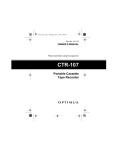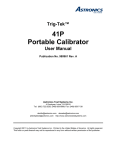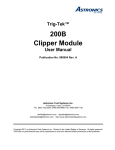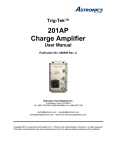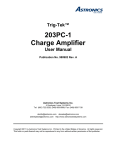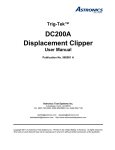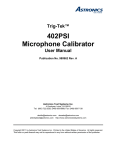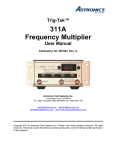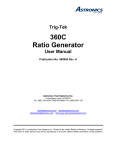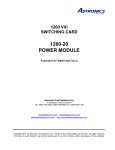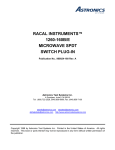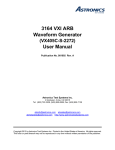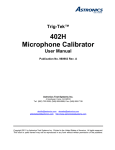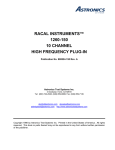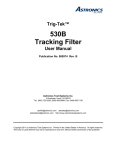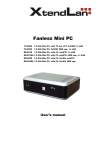Download Trig-Tek™ 850A/B Contact Chatter Detector User Manual
Transcript
Trig-Tek™ 850A/B Contact Chatter Detector User Manual Publication No. 980972 Rev. B Astronics Test Systems Inc. 4 Goodyear, Irvine, CA 92618 Tel: (800) 722-2528, (949) 859-8999; Fax: (949) 859-7139 [email protected] [email protected] [email protected] http://www.astronicstestsystems.com Copyright 2011 by Astronics Test Systems Inc. Printed in the United States of America. All rights reserved. This book or parts thereof may not be reproduced in any form without written permission of the publisher. THANK YOU FOR PURCHASING THIS ASTRONICS TEST SYSTEMS PRODUCT For this product, or any other Astronics Test Systems product that incorporates software drivers, you may access our web site to verify and/or download the latest driver versions. The web address for driver downloads is: http://www.astronicstestsystems.com/support/downloads If you have any questions about software driver downloads or our privacy policy, please contact us at: [email protected] WARRANTY STATEMENT All Astronics Test Systems products are designed to exacting standards and manufactured in full compliance to our AS9100 Quality Management System processes. This warranty does not apply to defects resulting from any modification(s) of any product or part without Astronics Test Systems express written consent, or misuse of any product or part. The warranty also does not apply to fuses, software, non-rechargeable batteries, damage from battery leakage, or problems arising from normal wear, such as mechanical relay life, or failure to follow instructions. This warranty is in lieu of all other warranties, expressed or implied, including any implied warranty of merchantability or fitness for a particular use. The remedies provided herein are buyer’s sole and exclusive remedies. For the specific terms of your standard warranty, contact Customer Support. Please have the following information available to facilitate service. 1. Product serial number 2. Product model number 3. Your company and contact information You may contact Customer Support by: E-Mail: Fax: [email protected] Telephone: +1 800 722 3262 +1 949 859 7139 (USA) (USA) RETURN OF PRODUCT Authorization is required from Astronics Test Systems before you send us your product or sub-assembly for service or calibration. Call or contact Customer Support at 1-800-722-3262 or 1-949-859-8999 or via fax at 1-949-859-7139. We can also be reached at: [email protected]. If the original packing material is unavailable, ship the product or sub-assembly in an ESD shielding bag and use appropriate packing materials to surround and protect the product. PROPRIETARY NOTICE This document and the technical data herein disclosed, are proprietary to Astronics Test Systems, and shall not, without express written permission of Astronics Test Systems, be used in whole or in part to solicit quotations from a competitive source or used for manufacture by anyone other than Astronics Test Systems. The information herein has been developed at private expense, and may only be used for operation and maintenance reference purposes or for purposes of engineering evaluation and incorporation into technical specifications and other documents which specify procurement of products from Astronics Test Systems. TRADEMARKS AND SERVICE MARKS All trademarks and service marks used in this document are the property of their respective owners. • Racal Instruments, Talon Instruments, Trig-Tek, ActivATE, Adapt-A-Switch, N-GEN, and PAWS are trademarks of Astronics Test Systems in the United States. DISCLAIMER Buyer acknowledges and agrees that it is responsible for the operation of the goods purchased and should ensure that they are used properly and in accordance with this document and any other instructions provided by Seller. Astronics Test Systems products are not specifically designed, manufactured or intended to be used as parts, assemblies or components in planning, construction, maintenance or operation of a nuclear facility, or in life support or safety critical applications in which the failure of the Astronics Test Systems product could create a situation where personal injury or death could occur. Should Buyer purchase Astronics Test Systems product for such unintended application, Buyer shall indemnify and hold Astronics Test Systems, its officers, employees, subsidiaries, affiliates and distributors harmless against all claims arising out of a claim for personal injury or death associated with such unintended use. FOR YOUR SAFETY Before undertaking any troubleshooting, maintenance or exploratory procedure, read carefully the WARNINGS and CAUTION notices. This equipment contains voltage hazardous to human life and safety, and is capable of inflicting personal injury. If this instrument is to be powered from the AC line (mains) through an autotransformer, ensure the common connector is connected to the neutral (earth pole) of the power supply. Before operating the unit, ensure the conductor (green wire) is connected to the ground (earth) conductor of the power outlet. Do not use a two-conductor extension cord or a three-prong/two-prong adapter. This will defeat the protective feature of the third conductor in the power cord. Maintenance and calibration procedures sometimes call for operation of the unit with power applied and protective covers removed. Read the procedures and heed warnings to avoid “live” circuit points. Before operating this instrument: 1. Ensure the proper fuse is in place for the power source to operate. 2. Ensure all other devices connected to or in proximity to this instrument are properly grounded or connected to the protective third-wire earth ground. If the instrument: - fails to operate satisfactorily shows visible damage has been stored under unfavorable conditions has sustained stress Do not operate until performance is checked by qualified personnel. Publication No. 980972 Rev. B 850A/B User Manual Table of Contents Chapter 1 .........................................................................................................................1-1 Introduction .....................................................................................................................1-1 Specifications ................................................................................................................................. 1-2 Controls .......................................................................................................................................... 1-2 Indicators ........................................................................................................................................ 1-3 Power ............................................................................................................................................. 1-3 Chapter 2 .........................................................................................................................2-1 Operation .........................................................................................................................2-1 Current Setting ............................................................................................................................... 2-1 Time Interval Switch Settings ......................................................................................................... 2-1 Contact Connections and Switches ................................................................................................ 2-1 Fault................................................................................................................................................ 2-2 Chapter 3 .........................................................................................................................3-1 Calibration .......................................................................................................................3-1 Timing Interval Adjustment......................................................................................................... 3-1 Contact Current Adjustment ....................................................................................................... 3-2 Astronics Test Systems i 850A/B User Manual Publication No. 980972 Rev. B This page intentionally left blank. ii Astronics Test Systems Publication No. 980972 Rev. B 850A/B User Manual List of Figures Figure 1-1. Trig-Tek 850A Contact Chatter Detector ........................................................................ 1-1 Figure 1-2. Trig-Tek 850B Contact Chatter Detector ........................................................................ 1-1 Figure 2-1. Switch S1 – Input Voltage Setting ................................................................................... 2-2 Figure 3-1. Calibration Adjustments .................................................................................................. 3-1 Astronics Test Systems iii 850A/B User Manual Publication No. 980972 Rev. B DOCUMENT CHANGE HISTORY iv Revision Date Description of Change A 2/23/2011 Document Control release B 5/17/2012 ECN00301 adding 850A configuration information. Added ITAR statements. B 8/29/2012 ECN01438 – Administrative document change. Remove ITAR statements. Astronics Test Systems Publication No. 980972 Rev. B 850A/B User Manual Chapter 1 Introduction The 850A/B Contact Chatter Detector (Figures 1-1 and 1-2) is designed to provide a means of monitoring the continuity of switch or relay contacts while being subjected to environmental stress. The unit has 10 channels each with a separate current source to activate the contacts. Contact current dial and X1– X0.1 switch sets the current of all the channels simultaneously for 0.1 to 11 milliamps. The difference between the two models is that the 850A uses BNCs for the channel inputs and the 850B uses screw terminals. Figure 1-1. Trig-Tek 850A Contact Chatter Detector Figure 1-2. Trig-Tek 850B Contact Chatter Detector Timing Interval Controls provide for setting from 1 to 999 microseconds or 1 to 999 milliseconds for the maximum time a discontinuity can exist. Each channel has a FAULT LED which will illuminate if a discontinuity exists for a longer period Astronics Test Systems Introduction 1-1 850A/B User Manual Publication No. 980972 Rev. B of time than is set in by the Timing Interval Switch. The LED will remain illuminated until reset either by the front panel reset switch or remotely via a reset terminal. The unit has a terminal strip where the FAULT condition of each channel can be recorded Low "NO FAULT" or HIGH "FAULT." Either Normally Closed (NC) or Normally Open (NO) contacts can be monitored. A toggle switch on each channel permits selection of NC or NO type contacts. Specifications Channel Inputs (10 each) BNC-type connectors (850A) Terminal interface (850B) Current Source Compliance 3 Volt (maximum). Current Source Accuracy ±3% FS. Timing Interval Accuracy Setting ±5 LSB. Fault Reset Terminal Permits FAULT Reset from remote location. Fault Output Terminals Provide a 12 Volt for “Fault” and 0 for “NO Fault” for each channel. Power Switch Turns Power ON or OFF. Contact Current Dial Permits continuous setting of 1-11. Operates in conjunction with the X1–X0.1 switch to provide 1 to 11 milliamps current through the contact being tested. X1–X0.1 Switch Multiplies the current dial by X1 or X0.1 Timing Interval MICROSEC-MILLISEC Switch Toggle switch to select either microseconds or milliseconds as the time interval. Timing Interval 001-999 Thumbwheel Switch Works in conjunction with the MICROSECMlLLISEC switch to select 001 to 999 either microsecond or millisecond time interval. FAULT Reset Switch Resets all FAULT LED'S when depressed. Controls Introduction 1-2 Astronics Test Systems Publication No. 980972 Rev. B 850A/B User Manual Indicators Power LED Illuminates when power is applied to the circuitry. FAULT LEDs (10 ea.) One for each channel. If a fault for the channel occurs, the LED will illuminate and remain on until the RESET switch is depressed. Power Operates from either 117 or 234 Volt RMS AC power 50 or 60 Hz at approximately 15 watts. Power Astronics Test Systems Introduction 1-3 850A/B User Manual Publication No. 980972 Rev. B This page intentionally left blank. Introduction 1-4 Astronics Test Systems Publication No. 980972 Rev. B 850A/B User Manual Chapter 2 Operation The 850A/B Contact Chatter Detector contains ten contact monitors in a chassis 19 inches wide by 3-1/2 inches high and 8 inches deep. The unit operates using either 117 or 234 Volts RMS power. The switch S1 next to the transformer (cover must be removed to view, see Figure 2-1) is marked 117 and 234. Set S1 to the appropriate position for the power that is to be used. Damage can be caused to the circuitry if S1 is in the 117 position and 234 V RMS AC power is applied. With S1 set properly, apply the AC power and the unit is ready to operate. Current Setting Before connecting any contact to the Contact Chatter Detector, set the current that will flow in the contact. Damage could be caused if the current was set higher than the contact current rating. The current is set between 0.1 to 11 millliamps using the contact current dial and the X1–X0.1 switch to provide two ranges. When the X1–X0.1 switch is in the X0.1 position the dial sets 0.1 to 1.1 milliamps and the X1 position provides 1 to 11 milliamps. The current setting is for all ten channels. To prevent damage to the contacts each channel voltage is clamped below 3 Volts. Time Interval Switch Settings The Time Interval Switches set the time discontinuity can exist (in a NC contact) before it is considered a FAULT, for a NO contact the opposite or closure for longer than the set time interval would constitute a FAULT. The time interval can be set from 1 to 999 microseconds or 1 to 999 milliseconds using the three digit thumb switch in conjunction with the MICROSEC-MILLISEC switch. The accuracy is the setting ±3 LSD. These switches should be set to the appropriate setting for the contact or contacts being monitored. Contact Connections and Switches Connect the contact to be monitored to a channel input BNC (850A) or terminal (850B). Set the Contact Switch to the required position NC if the contact is in the closed position and NO if the contact is being tested in the open position. Astronics Test Systems Operation 2-1 850A/B User Manual Publication No. 980972 Rev. B Fault When a NC (Normally Closed) contact has a discontinuity longer than the set in time interval, it is a FAULT, for NO (Normally Open) contact continuity for a period longer than the set in time interval constitutes a fault. When a FAULT is detected the FAULT LED for that channel illuminates and a +12 V signal is present on the FAULT output terminal on the rear panel. To remove the fault the FAULT RESET switch should be depressed, this removes the fault from all channels. The FAULT RESET can be accomplished remotely by applying +12 volts to the RESET terminal on the rear panel. Switch S1 Figure 2-1. Switch S1 – Input Voltage Setting Operation 2-2 Astronics Test Systems Publication No. 980972 Rev. B 850A/B User Manual Chapter 3 Calibration The circuitry of the 850A/B Contact Chatter Detector is stable and should require calibration only in the case of part failure. Astronics Test Systems recommends a 12-month calibration period or longer. Refer to Figure 3-1 for both calibration adjustments. Remove top cover of the 850A/B to access components. Timing Interval Adjustment 1. Connect a frequency counter to Pin 3 of U3 (Figure 3-1). 2. Set the MICROSEC-MILLISEC Switch to MICROSEC. 3. Set the timing adjust R33 for an indication of 1 MHZ ±10 kHz. 4. Place the MICROSEC-MILLISEC switch to MILLISEC. 5. The counter should indicate 1000 ±10 Hz. Pin 1, U3 R32 R33 Figure 3-1. Calibration Adjustments Astronics Test Systems Calibration 3-1 850A/B User Manual Publication No. 980972 Rev. B Contact Current Adjustment 1. Connect a current meter to Channel 1 Input. Set to read up to 11 milliamps. 2. Place the X1-X0.1 switch to X1. 3. Place the CONTACT CURRENT DIAL to 10. 4. Set the full-scale current adjust R32 for 10 ±.01 milliamps indication on the current meter. 5. Connect the current meter to each of the other nine channels and get 10 ±0.2 milliamps indication. 6. Place the X1-X0.1 Switch to X0.1. 7. All channels should indicate 1.0 ±0. 1 milliamps. 8. Set dial to 5, and X1-X0.1 Switch to X1. 9. All channels should indicate 5.0 ±0.1 milliamps. Calibration 3-2 Astronics Test Systems

















